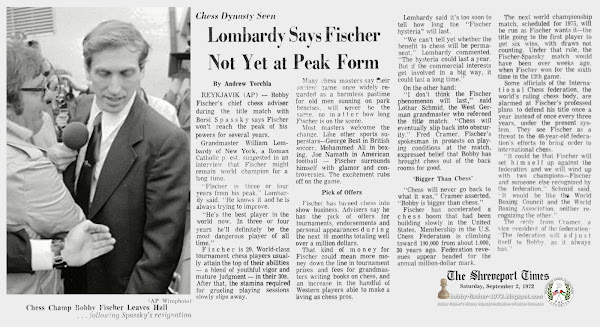The Times Shreveport, Louisiana Saturday, September 02, 1972 - Page 9
Lombardy Says Fischer Not Yet at Peak Form
By Andrew Torchia
Reykjavik (AP) — Bobby Fischer's chief chess adviser during the title match with Boris Spassky says Fischer won't reach the peak of his powers for several years.
Grandmaster William Lombardy of New York, a Roman Catholic priest, suggested in an interview that Fischer might remain world champion for a long time.
“Fischer is three or four years from his peak,” Lombardy said. “He knows it and he is always trying to improve.
“He's the best player in the world now. In three or four years he'll definitely be the most dangerous player of all time.”
Fischer is 29. World-class tournament chess players usually attain the top of their abilities — a blend of youthful vigor and mature judgment — in their 30s'. After that, the stamina required for grueling playing sessions slowly slips away.
Many chess masters say their ancient game, once widely regarded as a harmless pastime for old men sunning on park benches, will never be the same, no matter how long Fischer is on the scene.
Most masters welcome the change. Like other sports superstars—George Best in British soccer, Mohammed Ali in boxing, Joe Namath in American football — Fischer surrounds himself with glamour and controversies. The excitement rubs off on the game.
Pick of Offers
Fischer has turned chess into show business. Advisers say he has the pick of offers for tournaments, endorsements and personal appearances during the next 10 months totaling well over a million dollars.
That kind of money for Fischer could mean more money down the line in tournament prizes and fees for grandmasters writing books on chess, and an increase in the handful of Western players able to make a living as chess pros.
Lombardy said it's too soon to tell how long the “Fischer hysteria” will last.
“We can't tell yet whether the benefit to chess will be permanent,” Lombardy commented. “The hysteria could last a year. But if the commercial interests get involved in a big way, it could last a long time.”
On the other hand:
“I don't think the Fischer phenomenon will last,” said Lothar Schmid, the West German grandmaster who refereed the title match. “Chess will eventually slip back into obscurity.” Fred Cramer, Fischer's spokesman in protests on playing conditions at the match, expressed belief that Bobby has brought chess out of the back rooms for good.
‘Bigger Than Chess’
“Chess will never go back to what it was,” Cramer asserted. “Bobby is bigger than chess.”
Fischer has accelerated a chess boom that had been building slowly in the United States. Membership in the U.S. Chess Federation is climbing toward 100,000 from about 1,000 30 years ago. Federation revenues appear headed for the annual million dollar mark.
The next world championship match, scheduled for 1975, will be run as Fischer wants it—the title going to the first player to get six wins, with draws not counting. Under that rule, the Fischer-Spassky match would have been over weeks ago, when Fischer won for the sixth time in the 13th game.
Some officials of the International Chess federation, the world's ruling chess body, are alarmed at Fischer's professed plans to defend his title once a year instead of once every three years, under the present system. They see Fischer, as a threat to the 48-year-old federation's efforts to bring order to international chess.
“It could be that Fischer will set himself up against the federation and we will wind up with two champions—Fischer and someone else recognized by the federation,” Schmid said. “it would be like the World Boxing Council and the World Boxing Association, neither recognizing the other.”
The reply from Cramer, a vice president of the federation: “The federation will adjust itself to Bobby, as it always has.”
























